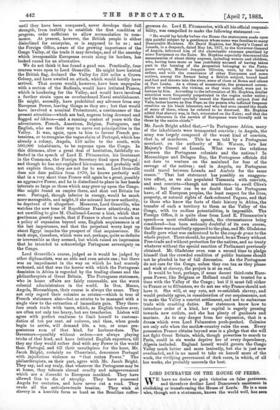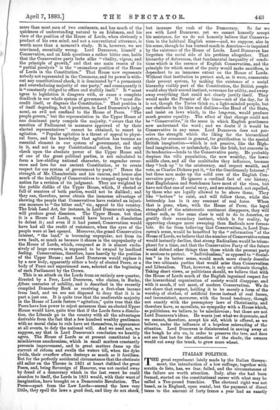LORD DUNRAVEN ON THE HOUSE OF PEERS.
WE have no desire to gain victories on false pretences, ce and therefore decline Lord Dunraven's assistance in abolishing or transforming the House of Lords. He is a man who, though not a statesman, knows the world well, has seen
more than most men of two continents, and has much of the quickness of understanding natural to an Irishman, and his view of the position of the House of Lords, when obviously a product of his own mind, and not a conventional utterance, is worth more than a moment's study. It is, however, we are convinced, essentially wrong. Lord Dunraven, himself a Conservative, and on Irish questions a rather bitter one, holds that the Conservative party lacks alike " vitality, vigour, and the principle of growth," and that one main reason of its " partial paralysis " is the " anomalous position of the House of Lords in the Constitution." That House now represents nobody not represented in the Commons, and its power is with- out any constitutional check, it is dominated by" a permanent and overwhelming majority of one party," and consequently it is " constantly obliged to efface and stultify itself." It " must agree to legislation it disagrees with, or cause a complete deadlock in our whole system of government." It " must dis- credit itself, or disgrace the Constitution." That position is of itself degrading, but it produces, in Lord Dunraven's judg- ment, an evil not confined to the House of Peers. "The people govern," but the representation in the Upper House of one dominant party compels the majority, " aware that the sanction of Parliament to measures approved of by their elected representatives " cannot be obtained, to resort to agitation. " Popular agitation is a threat of appeal to physi- cal force, and the knowledge that agitation has become an essential element in our system of government, and that in it, and not in any Constitutional check, lies the only check upon the absolute power of the Upper House and of one of the great political parties, is not calculated to form a law-abiding national character, to engender rever- ence and love for our ancient Constitution, or to create respect for our system of government by party." Hence the strength of Mr. Chamberlain and his caucus, and hence also much of the inability of Conservatives to compel appeal to the nation for a revision of its judgment. They are weighted by the public dislike of the Upper House, which, if elected or full of senators of both parties, would not be disliked ; and they can, therefore, never obtain the immense advantage of showing the people that Conservatives have resisted an injuri- ous measure to "the bitter end," viz., appeal to the country. The Irish Land Act, for instance, in Lord Dunraven's opinion, will produce great disasters. The Upper House, but that it is a House of Lords, would have braved a dissolution to defeat it ; and even if it had passed, Conservatism would have had all the credit of resistance, when the eyes of the people were at last opened. Moreover, the grand Conservative interest, " the land," is becoming unpopular, not from its own fault, so much as because it shares in the unpopularity of the House of Lords, which, composed as it is almost exclu- sively of large owners, is supposed to be swayed by landlord feeling. Conservatism, therefore, loses heavily by the position of the Upper House ; and Lord Dunraven would replace it by a new body, apparently either a body of elected Peers, or a body of Peers and experienced men, selected at the beginning of each Parliament by the Crown.
This is an attack on the Lords from an entirely new quarter, directed by a Peer, Lord Danraven, who claims, in Burke, fifteen centuries of nobility, and is described in the recently compiled Domesday Book as receiving a first-class income from land, and we are not disposed to deny that it is in part a just one. It is quite true that the unalterable majority in the House of Lords fosters " agitation," quite true that the Peers have less power to reject measures than an elected Upper House would have, quite true that if the Lords force a dissolu- tion, the Liberals go to the country with all the advantages derivable from the fact that a few hundred wealthy gentlemen with no moral claim to rule have set themselves, in appearance at all events, to defy the national will. And we need not, we suppose, say that in Lord Dunraven's conclusion we heartily agree. The House of Lords as at present constituted is a mischievous anachronism, which in small matters constantly prevents improvement, and in great matters dams up the current of reform and swells the waters till, when the dyke yields, their overflow often destroys as much as it fertilises. But for the perfectly accidental circumstance that the obstinate old sailor on the Throne in 1831 at heart disliked the great Peers, and, being Sovereign of Hanover, was not carried away by dread of a democracy which in the last resort he could abandon to itself, the Lords in 1831 would, with their want of imagination, have brought on a Democratic Revolution. The Peers—apart from the Law Lords—amend the laws very little, they spoil the laws a good deal, and they do not check,
but increase the rush of the Democracy. So far we
are with Lord Dunraven, yet we cannot honestly accept his assistance, for we do not honestly believe that Conserva- tism in the habitual English sense—and, we suppose, also in his sense, though he has learned much in America—is impaired by the existence of the House of Lords. Lord Dunraven has forgotten the social side of his problem altogether. That hierarchy of deferences, that fundamental inequality of condi- tions which is the essence of English Conservatism, and the principle for which most of the party would make sacrifices, is dependent to an immense extent on the House of Lords. Without that institution to protect and, as it were, consecrate their present system, by making the existence of a social hierarchy visibly part of the Constitution, the British people would obey their second instinct, reverence for utility, and sweep away everything that could not clearly justify itself. They would make the Premier of the time--not of the day, for it is not, though the Tories think so, a light-minded people, but one obstinate in its likes and dislikes—the Head of the State, and insist on laws which, in the long-run, would produce much greater equality. The effect of that change could not be " Conservative," in the sense in which English gentlemen now understand the word ; and we doubt if it would be Conservative in any sense. Lord Dunraven does not per- ceive the strength which the liking for the hierarchical system, for ornament in general, for gratification to the special British imagination—which is not pensive, like the High- land imagination, or melancholy, like the Irish, but concrete in its tendencies—lends to the Conservative party. He probably despises the villa population, the new wealthy, the lower middle class, and all the multitudes they influence, because they "look up " to the aristocracy, and respect wealth, and vote, as Charles Dickens put it, " for the Gentlemanly Interest ;" but these men make up the solid core of the English Con- servative party. He ignores a cardinal fact of our history, that Englishmen and Scotchmen have most of the vices, but have not that one of social envy, and are attracted, not repelled, by those who are legally allowed to be above them. They like " betters " to exist, and will follow them, while the bettership has in it any remnant of real force. When
that is gone, when, with the House of Peers, the legal stronghold of the aristocratic sentiment disappears, they will either sulk, as the same class is said to do in America, or gratify their secondary instinct, which is for reality, by approving changes more sweeping than Radicals now formu- late. So far from believing that Conservatism, in Lord Dun- raven's sense, would be benefited by the " reformation " of the House of Lords, we believe that the number of Conservative voters would instantly decline, that strong Radicalism would be trium- phant for a time, and that the Conservative Party of the future would defend other things than those which the present party
is anxious to protect. " Individualism," as opposed to " Social- ism " in its better sense, would much more closely describe the two ultimate parties that would arise than Conservatism and Liberalism. That, however, is only an ultimate thought. Taking short views, as politicians should, we believe that with the House of Lords much of the English ingrained respect for the hierarchical organisation of society would disappear, and with it much, if not most, of modern Conservatism. We do not share that respect, holding it to be merely a form of the worship of clothes, of artificial forces instead of real forces, and inconsistent, moreover, with the broad tendency, though not exactly with the peremptory laws of Christianity, and therefore have, as moralists, no sympathy with a House which, as politicians, we believe.to be mischievous ; but those are not Lord Dunraven's ideas. He wants just what we deprecate, and we cannot, therefore, accept his aid, which is offered, as we believe, under the influence of a hopeless misreading of the situation. Lord Dunraven is disinterested in sawing away at the bough he sits on, in order to preserve the tree, and does not see that but for the attraction of the shade, the owners would cut away the trunk, to grow more wheat.



































 Previous page
Previous page